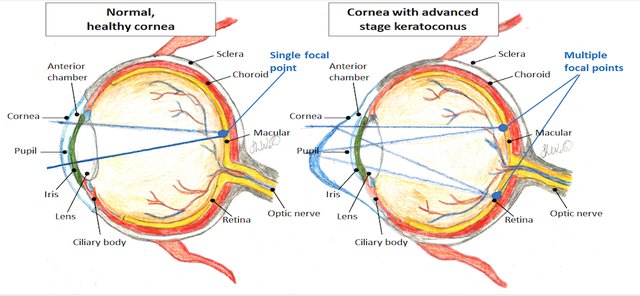Researchers funded by Fight for Sight are developing a new device to be used in both eye clinics and labs for the early detection and diagnosis of keratoconus.

The project, which is jointly funded by the Keratoconus Self-Help and Support Association (KC Group) and Fight for Sight, is being conducted at Loughborough University and aims to detect keratoconus before irreparable damage is done to the cornea, the clear round-shaped front surface of the eye.
In keratoconus, the cornea becomes progressively thinner and weaker over time, eventually causing a cone-shaped protrusion to develop. The abnormal change of shape causes a person to have blurred and distorted sight as it prevents the light that enters their eye from being correctly focused. Keratoconus is often detected at a stage where it has already had an impact on a person’s eyesight and in advanced cases, corneal transplantation surgery may be required.
Dr Samantha Wilson, who is leading the project at Loughborough University, said: “The ability to understand, detect and diagnose corneal diseases, including keratoconus, at an earlier stage would mean that patients can receive treatment sooner. In the long-term, we expect that such devices will be routinely used by surgeons and ophthalmologists to detect, diagnose and treat corneal diseases before they have a significant effect on vision.”
Researchers at Loughborough University will work together with experts in the ophthalmology field to develop a lab-based laser tool that is more compact and portable, and therefore easier to use in both a lab and clinical setting. The tool will detect/monitor subtle biomechanical structural deficits that occur during early-stage corneal disease progression; specifically, localised thinning of the cornea.
It is anticipated that the outcome of this project will mean that patients can receive treatment to maintain and restore their vision sooner. Ultimately, this will also have considerable impact on addressing the national and global cornea transplant shortage.
Philip Jaycock, a consultant ophthalmic surgeon and collaborator on this project at Loughborough University said: “The development of devices that can measure the strength of the cornea will help earlier diagnosis and allow further investigation of new treatments to maintain vision and potentially improve vision for patients with keratoconus.”
Chief executive of Fight for Sight, Sherine Krause, added: “We’re delighted to be funding this valuable research project. We know that early detection is hugely important for sight-threatening eye conditions and this in turn will lead to better outcomes for people with keratoconus and other corneal diseases. Eye research is more important than ever in the age of the COVID-19 pandemic and we must continue to fund research for new, more efficient tests, treatments and cures for the leading causes of blindness and sight loss.”




